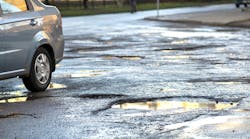With unemployment rates in the U.S. at historic levels due to the economic impact of the COVID-19 pandemic, it is more important than ever to invest in areas that help get more people back to work. Today, lawmakers should prioritize the passage and implementation of a comprehensive infrastructure program, as part of a future round of stimulus funding that would immediately provide employment opportunities for many Americans.
Even before we started feeling the economic impacts of COVID-19, our country was in dire need of these upgrades. Data from the National Association of Manufacturers (NAM) reveals that underinvestment in U.S. infrastructure worsens by the year, and infrastructure investment before the pandemic was only one-third of what it was in 1960.
Manufacturers, who today continue to provide essential resources to the medical community and other front-line workers, are currently relying on outdated roads, bridges, waterways, ports, runways and drinking water systems, many of which are more than 50 years old. More than 54,000 bridges across the U.S. are rated “structurally deficient” according to NAM. Roadways, ports and waterways are in disrepair. The American Society of Civil Engineers (ASCE) released a report card in 2017 of infrastructure in the country and gave the nation a rating of D+. According to the U.S. Department of Transportation, 65% of major U.S. roads are rated as “less than good condition.”
In addition to the challenges we will now face due to the current economic environment, these deficiencies take an additional toll on manufacturers’ bottom lines, causing unreliable delivery times and increased fleet maintenance costs. Congested highway networks add $74.5 billion to transportation costs for manufacturers moving goods and raw materials by truck, according to the American Transportation Research Institute.
In order for America to remain globally competitive now and after this pandemic, our leaders must be committed to improving our infrastructure. China’s infrastructure investment is almost double the size of the infrastructure spending in the U.S., and India’s infrastructure investments are growing at a rate that triples the infrastructure outlays of the U.S., Canada and Mexico combined. Manufacturing workers in the U.S., and all Americans, should refuse to settle for infrastructure that lags behind the rest of the world.
Many have acknowledged that the current economic challenges bring an opportunity to upgrade the nation’s neglected transportation systems. Stay-at-home orders covering nearly the entire country in March and April kept Americans off the road, and gas tax revenues have plummeted as a result. According to the American Association of State Highway and Transportation Officials, state and local governments need $50 billion to ensure that they can continue existing transportation construction and maintenance programs without disruption. The nation’s airports also need a backstop to make up for lost user fees. Keeping current infrastructure projects afloat is only a start.
Our deteriorating national infrastructure is not solely a state or federal issue. It is not a small or large business issue. It is not a Democratic or a Republican issue. Infrastructure is an American issue that directly affects our ability to compete in the global marketplace and provide financial security for millions of American families.
Once it is safe to work, the U.S. government should mobilize to rebuild our nation’s infrastructure. It would ensure that the nation emerges on the other side with a stronger, competitive economy. Infrastructure projects put people to work at high wages, create demand for materials and equipment and generate tax revenues for governments at all levels. They build systems of lasting public benefit, improving the safety, convenience and efficiency of commerce, communication and travel.
Making substantial investments in America’s infrastructure will not only put Americans back to work, but it will improve the lives of workers, while helping all manufacturers better serve their customers and communities. It will bolster the security of our nation, and it will strengthen the ties that bind us together as a country, improving commerce and communication and paving the way for the success of the next generation.
Congress must invest now. I urge our elected leaders to work together to prioritize a bold vision for improving infrastructure. Congress’s next stimulus bill must include aggressive investments in infrastructure such as highways, bridges and airports. It’s good for our citizens, our economy, and our country to remain globally competitive. We cannot afford to wait.
Michael McGarry is chairman and CEO of PPG. He also serves as chairman on the board of directors of the American Coatings Association, and is on the board of directors of United States Steel Corporation.



